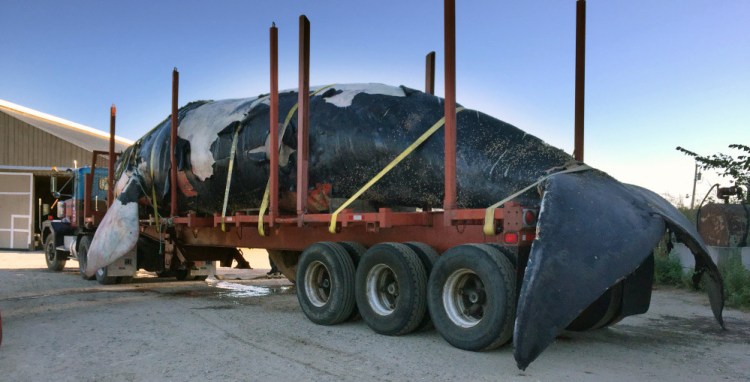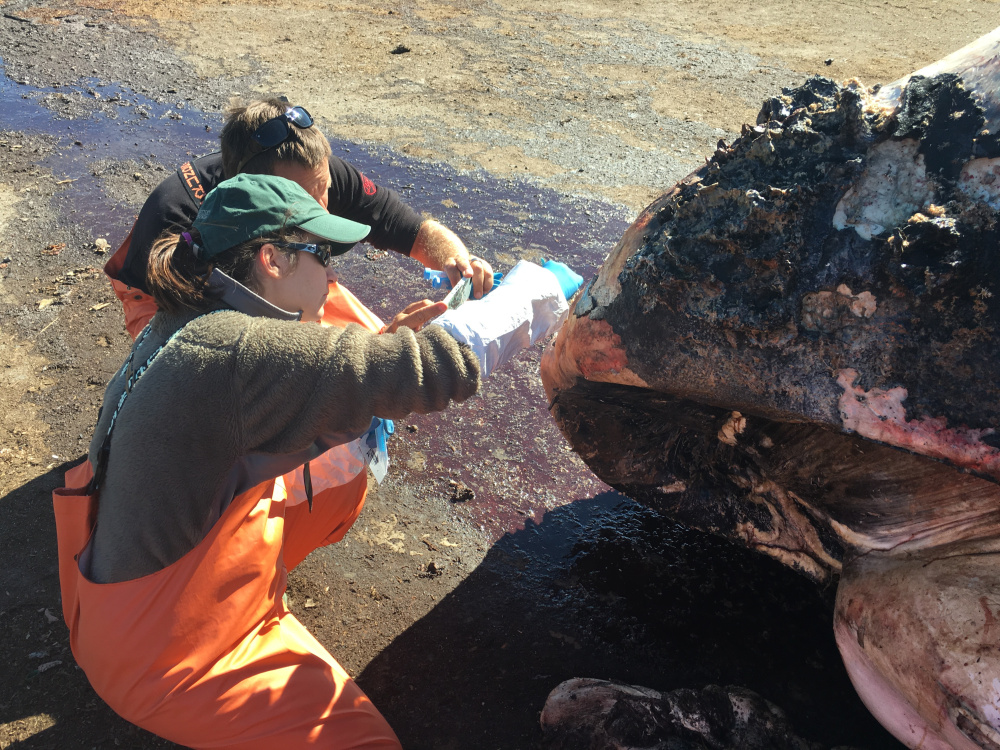The National Oceanic and Atmospheric Administration is investigating how an endangered right whale found floating off the Maine coast Friday became entangled in fishing gear that probably caused its death.
Jennifer Goebel, a spokeswoman for NOAA’s Greater Atlantic Region in Gloucester, Massachusetts, confirmed Sunday evening that fishing gear ropes were the most likely cause of the North Atlantic right whale’s demise.
Goebel said NOAA will try to identify the gear’s owner, but she was uncertain whether punitive action would be taken. If the owner can be identified, NOAA could use the incident to raise public awareness and develop strategies for preventing future occurrences.
“We feel like the entanglement played a pretty significant role in the whale’s death,” Goebel said. “It was severe. There was gear wrapped around the whale’s head (and mouth), its flippers and its tail.” Fishing gear ropes can restrict a whale’s movement over time and lead to its death, she said.
Goebel said there are an estimated 500 right whales still living in the North Atlantic, and one of the greatest threats to the population is fishing gear entanglement.
“It has become a huge problem for the right whale,” she said.
According to NOAA, North Atlantic right whales have been listed as an endangered species since 1970. They can weigh up to 79 tons, reach lengths of 50 feet and have a lifespan of at least 70 years.
Right whales feed by opening their mouths and swimming through large patches of zooplankton, their primary food source. Females are usually larger than males. Distinguishing features include a stocky body, black coloration, no dorsal fin and a large head that’s about one-quarter of the whale’s body length.
The deceased right whale, spotted Friday by people on a whale-watching boat off the coast of Boothbay Harbor, was an adult female that weighed about 45 tons and was 43 feet long.
After the whale sighting was reported, a boat crew from the Maine Marine Patrol towed the animal from Boothbay Harbor to Cape Small, off the coast of Phippsburg, where a 47-foot Coast Guard boat met them Saturday afternoon.
Petty Officer Joshua Ponz said it took his six-man crew about five hours to tow the whale by its tail to Portland Harbor, where the carcass was off-loaded Saturday evening onto a tractor-trailer truck at Portland Yacht Services on Commercial Street.
“It was very slow going,” Ponz said. “It was very sad to see.”
Smith Trucking and Excavation of Gorham provided a truck flatbed normally used to haul large loads of lumber for transporting the whale down Congress Street in Portland to Benson Farm in Gorham.
“I’ve never hauled a whale before, but I’ve moved some pretty big houses,” said owner Paul Smith. “When I took this job I didn’t realize how big the whale was going to be. The tail was so long it hung over the end of the trailer.”
Smith said he purposely transported the whale during the early morning hours – between 2:30 and 3:30 a.m. Sunday – to avoid traffic. He was escorted by a police cruiser.
“We just went easy,” said Smith, 64.
Ed Benson, owner of Benson Farm, said the whale’s journey from Portland’s waterfront to his farm on Plummer Road proved to be quite the spectacle.
“We were surrounded by cab drivers on Congress Street. They were trying to take the whale’s picture,” Benson said.
Later Sunday, a team of scientists and researchers from around the country spent the day performing a necropsy at the farm. Goebel said the researchers came from NOAA, the Riverhead Foundation for Marine Research and Preservation in New York, Woods Hole Oceanographic Institution in Massachusetts, Marine Mammals of Maine, the Seacoast Science Center of New Hampshire, the International Fund for Animal Welfare, New England Aquarium and the University of North Carolina-Wilmington.
The remains of the whale will be composted and its bones turned over to federal officials, said Benson, whose farm is licensed by the Maine Department of Environmental Protection.
Send questions/comments to the editors.




